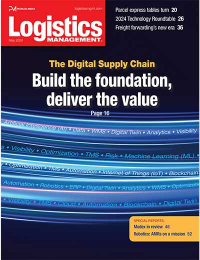Note to CEOs: Ignorance isn’t bliss—in fact It can be costly!
Latest Logistics News
USPS cites continued progress in fiscal second quarter earnings despite recording another net loss U.S. rail carload and intermodal volumes are mixed, for week ending May 4, reports AAR New Ryder analysis takes a close look at obstacles in converting to electric vehicles Norfolk Southern shareholders sign off on 10 board of directors nominees Inflation and economic worries are among top supply chain concerns for SMBs More NewsThe Covid pandemic exposed a grim reality: Most shippers have supply chains that are completely unprepared to deal with catastrophic issues.
For the past 18 months, I have been running around the country proclaiming an important message to C- Level executives. Distilled down to a very basic level, the message has three main points:
1.CEOs get the supply chains they are willing to live with.
2. If C-Level executives take their supply chain capabilities for granted, don’t be surprised by the consequences of having a mediocre supply chain.
3. C-Level executives cannot delegate responsibility for building a great supply chain. Stop blaming your people and accept that there will be decisions and investments that will require their input, engagement and/or approval.
While this is a challenging message for some executives to accept, it has also resulted in some interesting conversations with those who have responded with the question: “What needs to be done in order to have the supply chain that our company needs?”
I tell them these three things.
First, ask how much do you really know about the impact your supply chain has on your company’s operations and profitability.
Caution: There are lots of senior executives who have the art of “problem identification” down to a science. They are much better at telling me the things that are wrong with their companies than they are at identifying solutions to address these critical issues.
Whether it’s getting the parts or products that your company needs, having too much inventory, or not being able to meet your customer’s requirements, there are no shortage of issues that can have an impact on your company’s working capital, cash conversion cycles, and overall profitability.
If these C-Level executives are problem finders versus problem solvers, it may be difficult to identify the root causes of the issues. As an alternative, these organizations may need to follow the advice from experts like MIT Professor Dr. David Simchi-Levi. His advice is to map and stress test their supply chains so they can understand how material flows from their suppliers through their organization and into the hands of their customers.
Second, don’t be afraid to challenge the status quo. On numerous occasions we’ve asked C-Level executives: “If you’re not willing to ask some important questions about your company’s supply chain capabilities, who will?
One of the most important questions to ask is, “What do we need to start/stop/continue doing in order to maximize the effectiveness of our supply chain processes?” Another important question: “Is our supply chain built on facts or assumptions?” During our supply chain consulting projects, when we hear that things are being done because “we’ve always done it that way,” we know it’s time for us to do a deeper dive into that part of the operation as there is a strong likelihood that their supply chain is based on assumptions that may not be true.
Third, every C-Level executive needs to periodically ask: “What are we willing to change in order to have a supply chain that is an asset instead of an anchor?” A couple of years ago I heard a great presentation where the EVP of a Fortune 100 company noted that his firm’s Board of Directors had authorized a $1.5 billion investment into modernizing their supply chain. It was a big risk, but two years after completing the project, his company had already realized a savings in excess of $3 Billion.
After I shared that story at a recent presentation, an audience member told me his company would never take that type of risk. So I asked him, “How do you know?” When he told me that his company was too provincial and conservative, I couldn’t help but ask: “Are they also stupid?”
Sensing that this question caught him off guard, I asked why would his company reject an investment that had a 100% ROI within a two-year period? Perhaps it’s because no one has ever challenged them to move from being ignorant to informed about what can happen when C-Level executives decide that they are willing to make the proper investment in their supply chain.
To avoid the costly “ignorance is bliss” syndrome, study your supply chain, challenge the status quo, and consider which supply chain investments can have the greatest return.

Article Topics
Latest in Logistics
Key benefits of being an Amazon Business customer with Business Prime USPS cites continued progress in fiscal second quarter earnings despite recording another net loss U.S. rail carload and intermodal volumes are mixed, for week ending May 4, reports AAR New Ryder analysis takes a close look at obstacles in converting to electric vehicles Norfolk Southern shareholders sign off on 10 board of directors nominees Between a Rock and a Hard Place Inflation and economic worries are among top supply chain concerns for SMBs More LogisticsSubscribe to Logistics Management Magazine

Find out what the world's most innovative companies are doing to improve productivity in their plants and distribution centers.
Start your FREE subscription today.
May 2024 Logistics Management

Latest Resources














